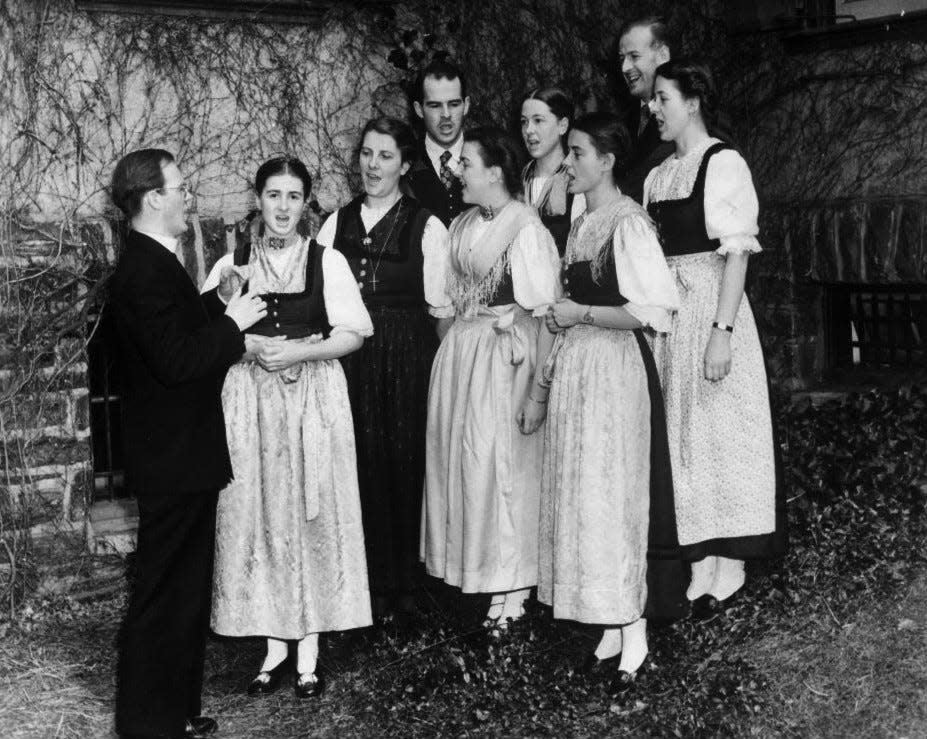Out of Our Past: The Trapp Family Singers brought their 'sound of music' to Richmond

- Oops!Something went wrong.Please try again later.
- Oops!Something went wrong.Please try again later.
- Oops!Something went wrong.Please try again later.
Corrections: An earlier version of this column included multiple inaccuracies about the history of the von Trapp family. The name of the singing group was the Trapp Family Singers. Baron Georg Johannes von Trapp was a noble, and Maria was a tutor for one of the children. The family lost much of its fortune but not all in a bank crash. The earlier account also misstated Maria's role in several steps of musical group's career, and mistakenly suggested that the family traveled directly to the United States after leaving Austria. We regret the errors.
Jan. 31 in history:
In 1865, General Robert E. Lee was named Commander-in-Chief of Confederate Armies during the South’s bid to split from the nation due to the fiscal advantages of promulgating human slavery.
In 1905, the first automobile to exceed 100 mph, did so at Daytona Beach. This was hailed as an incredible feat and a milestone for humanity.
In 1933, Adolph Hitler promised parliamentary democracy for Germany. (He later reneged.)
In 1950, U.S. President Harry Truman publicly announced support for the development of a hydrogen bomb. The United States would be the only country to use it against another nation. Truman came to Richmond on June 17, 1948, Oct. 12, 1948, July 7, 1953, and May 8, 1956.
More Out of Our Past: Truman came to Richmond to pick 'Madonna' site, returned as president
In 1971, "My Sweet Lord" by George Harrison hit number one on the UK pop chart.
In 2018, the Donald J. Trump administration formally suspended the Clean Water Act, which combated pollution and maintained chemical, physical and biological integrity in the nation’s water supply.
On Jan. 31, 1945, the "Sound of Music" was heard on Main Street long before the famous Rodger’s and Hammerstein Broadway musical, or the 1965 big screen hit with Julie Andrews.
The real Trapp Family Singers were appearing in Richmond before a packed house at the Tivoli Theater.
Seven von Trapp daughters with their mother and father marched onto the darkened stage at 910 East Main, carrying lanterns and singing as each took a place in the family circle.
Baron Georg Johannes von Trapp — a highly decorated military Austro-Hungarian naval hero — introduced himself to the local audience. He explained his two older sons were in the Army overseas, and one smaller son was at home on the farm in Vermont where the family spent their free time living the rural life they had had to abandon when they refused to live under Hitler’s rule in Austria.
"The Star Spangled Banner" opened the program and the audience joined in. Hymns and carols were sung, along with lovely old church music, Mozart, songs of Schubert, Brahms madrigals, folk songs, yodels, mountain calls, and Austrian dance melodies. A large part of the program consisted of Christmas hymns and carols, as the season was not over in some parts of Europe until Feb. 2, Maria explained.
Like in the movie, Georg von Trapp, a widowed Austrian noble, had married the tutor for one of his children. When the von Trapps lost part of their fortune in a bank crash, the family's hobby — singing — became a profitable family profession with the help of a local priest.
In March of 1938, when Nazis marched into Salzburg, the von Trapps decided it was time to leave. They left their home behind and never returned. They did not climb any mountains to escape like in the movie; they left for Italy and eventually made their way to America.
Once in the United States, they struggled to establish themselves. They sang mostly in German, dressed like refugees, and had a repertoire of difficult classical music. They hired a top manager and a publicist and, before long, the singing group became a sensation.
Maria wrote a book, "The Story of the Trapp Family Singers." The book was made into two German-language films, then fell into the hands of a Broadway producer, and in 1959, the much-loved musical "The Sound of Music" became the last collaboration between Broadway legends Richard Rodgers and Oscar Hammerstein.
In 1965 "The Sound of Music" was adapted as a film directed by Robert Wise (who was from Winchester, Indiana), starring Julie Andrews and Christopher Plummer. The movie won five Academy Awards. Songs from the production — "Edelweiss," "My Favorite Things," "Climb Every Mountain," "Do-Re-Mi" and the title song — are classics. "The Sound of Music" movie today continues to captivate audiences.
Surviving members of von Trapps and their descendants still have their farm in Vermont and music is a major part of their lives.
Contact columnist Steve Martin at stephenmonroemartin@gmail.com.
This article originally appeared on Richmond Palladium-Item: Richmond history: Trapp Family Singers brought 'sound of music'

